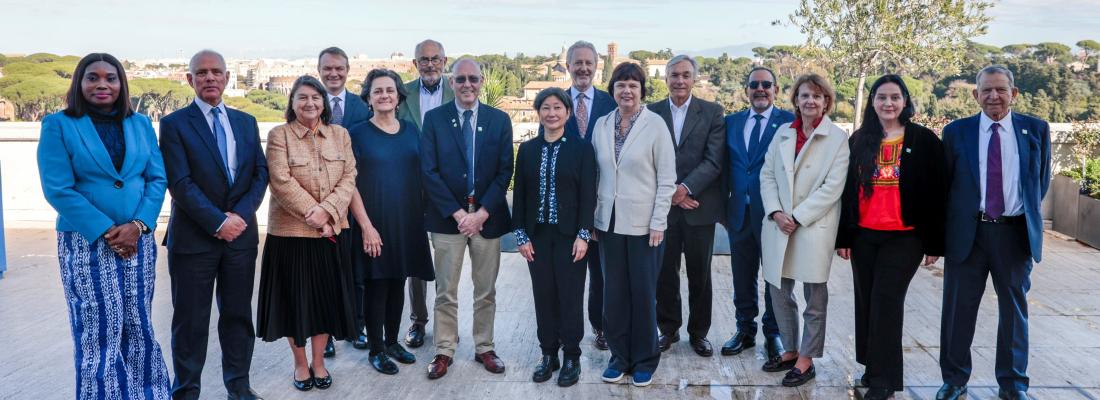Food, Global Health Reading time 5 min
Akiko Suwa-Eisenmann, a high-level expert on food security and nutrition for the United Nations
Published on 18 December 2023

In Rome on Wednesday, 29 November, Akiko Suwa-Eisenmann, an INRAE research director, was elected chairperson for the 2023-2025 term of the Steering Committee of the United Nation's Committee on World Food Security's (CFS) High-Level Panel of Experts on Food Security and Nutrition (HLPE-FSN), which she has been a member of since October 2021.
"As we find ourselves at the crossroads of global challenges, the urgent need to place food security at the top of the international political agenda has never been more vital. Our responsibility as the UN-mandated science-policy interface on food security and nutrition has never been so pressing," explained Akiko Suwa-Eisenmann during this election.
How did you come to serve on the UN's High-Level Panel of Experts on Food Security and Nutrition?
A. Suwa-Eisenmann: "My studies and then my career in economics have been driven by my interest in economic policy. For many years now, I have also been interested in world food security, particularly in terms of the impact that world trade has on households and businesses in the Global South. Above all, I like to impart knowledge to decision-makers in an accessible way, participate in public discourse and understand what determines the political feasibility of reforms. It has been with that in mind that over my career I have also worked as a consultant for the AFD (Agence française de Développement), World Bank and the OECD Development Centre.
In 2021, I seized the chance to serve on the HLPE-FSN, which is the sole UN-mandated science-policy interface on food security, and I am now extremely pleased to have been elected chairperson of the HLPE-FSN's Steering Committee."
What exactly is the work of the HLPE-FSN's Steering Committee and what are your responsibilities as its chair?
A. Suwa-Eisenmann: "At the UN Committee on World Food Security's request, the HLPE-FSN's Steering Committee prepares reports that provide decision-makers with state-of-the-art knowledge about a given issue. HLPE report drafting follows a well-defined process, marked by consultations at various stages and review by outside experts. The multi-disciplinary Steering Committee approves each step and endorses the report and its recommendations. The recommendations are discussed with the CFS in a process of political convergence involving various CFS members such as governments, multilateral partners, the private and civil sectors. The CFS then issues a set of voluntary guidelines that form the baseline in that area of food security.
As the Steering Committee chairperson, together with our Vice-Chair, Iain Wright (ILRI), we are responsible for the quality of the HLPE-FSN's work and compliance with its values, i.e. independence, transparency, accessibility, openness to all through a participatory consultative process, and rigorously obtained evidence-based arguments."
What are the values and concerns that underpin your commitment?
Food security, an extremely topical issue, as it is connected to the environment, health and geopolitics.
A. Suwa-Eisenmann: "First and foremost, I am a researcher and teacher, who strives to identify the data on an issue, evaluate the quality of the pros and cons, state those points of consensus in terms of research or what is up for debate and why. I carry out social science research and know how important the way a society operates is but also how difficult that can be for an outside observer to understand.
At the HLPE-FSN, we take particular care to give value to all forms of knowledge, including traditional knowledge, which may not lead to research papers but can play an important role in terms of nutrition and environmental protection.
We want to promote a vision of food security based on respect for human rights. Food security does, in fact, encompass six dimensions: availability, access (prices), health and nutritional characteristics (use), on-going supply in periods of crisis or conflict (stability), respect for the environmental, social and economic conditions that ensure food security into the future (sustainability) and the right, for both individuals and groups, to take part in decisions about what they eat or produce (agency)."
The Committee on World Food Security’s High-Level Panel of Experts on Food Security and Nutrition
The High-Level Panel of Experts on Food Security and Nutrition (HLPE-FSN) is the UN Committee on World Food Security's science-policy interface.
The HLPE-FSN's aim is to facilitate policy dialogues and inform policy formulation by providing comprehensive, independent and evidence-based analyses.
It has a steering committee made up of 15 world-renowned experts in a broad range of food-security and nutrition-related areas, project teams specially selected to analyse and report back on specific issues, and a secretariat hosted by the FAO.
Among the experts who form the HLPE-FSN's new Steering Committee, there is also Marie-Josèphe Amiot-Carlin, Honorary INRAE Research Director in Nutrition and Public Health.
Mini-CV

- Professional background
2023: INRAE Research Director, PSE-Paris School of Economics
1993-2002: Associate Researcher, Delta Unit (CNRS, ENS, EHESS)
1992-1999: Affiliate Researcher, Centre for Economic Policy Research (CEPR), London (GB)
2018-2023: Co-Director, Public Policy and Development Master degree program (EHESS-ENS/PSL-ENPC)
Since 2016: Member of the European Development Research Network
Since 2013: Member of Le Cercle des économistes
-
Education
1992: PhD in Economics, Ecole des hautes études en sciences sociales (Paris)
1988: Graduated from the Institut d'études politiques de Paris
1984-1988: Ecole normale supérieure (Paris)
